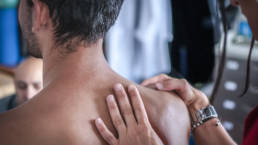Don’t let headaches control your life any longer. Take advantage of these great tips!
Most people have experienced a headache at least once in their lives. Headaches may cause pain around the head, face, neck and shoulder region. Almost 15% of the population suffer from more severe headache disorders such as migraines. Headaches don’t only just cause pain and discomfort, but may also affect our daily functioning, social life and work capacity. People between the ages of 20-50 are most commonly affected however children and adolescents may also experience headaches.
Headaches Are Classified Into Two Categories
- Primary: Occur independently and are not caused by an illness or disease. Maybe caused by dehydration, poor posture, lack of sleep, stress, eye strain, alcohol and caffeine.
- Secondary: Usually caused by an underlying health condition.
The Most Common Primary Headaches Are Outlined Below
- Tension-Type: pressure or tightness around forehead, pain in back of head.
- Migraine: severe pain or throbbing, sometimes affects only one side of the face/head, nausea, sensitivity to light or sound.
- Cluster: pain in and around one eye, tearing, congestion, sweating.
Headache disorders caused by an underlying health condition may present with a number of warning signs. If you are experiencing any of the following symptoms, please contact your preferred health practitioner as soon as possible.
- Unusually severe headache
- Headache that gets progressively worse >24 hours
- Sudden or explosive headache
- Headache that first develops >50 years of age
- Headaches accompanied by neck stiffness, fever, visual changes, slurred speech, weakness, reduced alertness or memory
- Headache after a head injury
- Headache that worsens with coughing or movement
- Headaches that affect normal daily activities
- Worst headache you’ve ever experienced
TIPS ON HOW TO AVOID COMMON HEADACHE TRIGGERS:
- Drink at least 4.5L of water per day
- Appropriate amount of sleep (at least 7 hrs per night)
- Manage stress levels
- Regular exercise & healthy eating (includes not skipping meals!)
- Maintain good posture & keep moving during the day
- Seek advice and treatment from a health care professional
TREATMENT FOR YOUR HEADACHES
Receiving Treatment from a Chiropractor, Physiotherapist or Occupational Therapist can be a safe and natural form of pain relief that has shown to be effective in reducing short and long term headache symptoms.
A chiropractor will look at the joints in your neck and spine and determine if there are any chiropractic techniques that may assist your condition. A Physiotherapist may assess your musculoskeletal structure to verify sources of headaches, and an Occupational Therapist may use soft tissue techniques to the muscles of your neck and shoulders as well as look into occupational causes into the headache.
Our practitioners have helped many overcome headaches and can offer individualized solutions to your condition. It is important to speak with your health professional in first obtaining a diagnosis and best approach to treating your headache.
Headache Tips Written by Dr. Kristina Kristic
Resources
- Bronfort G, Haas M, Evans R, Leininger B, Triano J. (2010). Effectiveness of manual therapies: UK evidence report. Chiroprat Osteopat, 18(3). doi: https://doi.org/10.1186/1746-1340-18-3
- Bryans R, Descarreaux M, Duranleau M, Marcoux H, Potter B, Ruegg R, Shaw L, Watkin R, White E. (2011). Evidence-based guidelines for the chiropractic treatment of adults with headache. J Manipulative Physiol Ther, 34(5), 274-89. doi: 10.1016/j.jmpt.2011.04.008.
- Castien RF, Van Der Windt DAWM, Grooten A, Dekker J. (2010). Effectiveness of manual therapy for chronic tension-type headache; A pragmatic, randomised, clinical trial. Cephalagia, 31(2), 133-143. doi: https://doi.org/10.1177/0333102410377362
- Shao E, Hughes J, Eley R. (2017). The presenting and prescribing patterns of migraine in an Australian emergency department: A descriptive exploratory study. World J Emerg Med, 8(3), 170-176. doi: 10.5847/wjem.j.1920-8642.2017.03.002
Related Posts
Korean-Fluent Chiropractor West Perth
29 November 2020
Many people in the area suffer from various types of body aches and pain that seem to be challenging to treat effectively. Over time, this sort of ongoing pain can truly limit a person's overall health and inner well-being. While there are prescription medications often used to treat serious pain…
0 Comments3 Minutes
What is a Shoulder Impingement Pt. 2
2 February 2017
Last time we discussed the basics of Shoulder Impingement, alongside the causes, risks and how shoulder impingements are diagnosed. his week we will discuss signs, symptoms and treatment.
0 Comments2 Minutes


